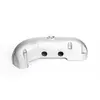Mobile:+86-311-808-126-83
Email:info@ydcastings.com
metal pipe end caps
The Importance of Metal Pipe End Caps in Industrial Applications
In various industrial and construction settings, the need for reliable and durable components is paramount. Among these components, metal pipe end caps play a crucial role in ensuring the integrity and functionality of piping systems. These caps serve as protective covers for the ends of pipes, preventing contamination, corrosion, and mechanical damage. This article delves into the significance of metal pipe end caps, their various types, applications, and the benefits they offer.
What are Metal Pipe End Caps?
Metal pipe end caps are fittings that are used to seal the ends of pipes. They come in various shapes and sizes, designed to fit different types of pipes and materials. Typically made from metals such as stainless steel, carbon steel, or aluminum, these end caps provide robust protection against various environmental factors. Metal end caps are particularly advantageous for applications where durability and strength are paramount, making them a favored choice across numerous industries.
Key Benefits of Metal Pipe End Caps
1. Protection Against Contamination One of the primary functions of end caps is to prevent foreign materials from entering the open ends of pipes. This is essential in applications such as water treatment facilities, where contamination can lead to significant health risks.
2. Corrosion Resistance Metal end caps, particularly those made from stainless steel or other corrosion-resistant materials, help protect the interior of the pipe from rust and degradation, thus extending the life of the piping system.
3. Pressure Maintenance In high-pressure applications, such as gas and hydraulic systems, metal pipe end caps can help maintain the necessary pressure within the pipes. This is vital for the efficient functioning of the system and to prevent leaks.
4. Aesthetic Appeal In some applications, particularly in architecture and design, metal end caps can provide a finished, polished look to exposed pipes, enhancing the overall aesthetic of the space.
5. Ease of Installation Most metal pipe end caps are designed for quick and easy installation. This ease of use can lead to significant reductions in labor costs and installation time across projects.
metal pipe end caps

Types of Metal Pipe End Caps
Metal pipe end caps come in various configurations to suit different applications. The most common types include
- Weld-On Caps These are attached to the pipe through welding, providing a permanent and durable seal. Weld-on caps are often used in applications requiring high strength and pressure retention.
- Threaded Caps These caps feature internal threads that allow them to be screwed onto the pipe, providing a secure and adjustable seal. Threaded caps are often used in applications where maintenance and access to the piping system may be necessary.
- Slip-On Caps Designed to slide over the end of a pipe, slip-on caps are typically secured with screws or bolts. They are easy to install and remove, making them suitable for temporary applications.
- Flanged Caps These caps feature a flange that allows them to be bolted onto the pipe, creating a strong, leak-proof seal. Flanged caps are commonly used in large-scale industrial applications that require frequent access to the piping system.
Applications in Different Industries
Metal pipe end caps are widely used across various industries, including oil and gas, chemical manufacturing, construction, and water treatment facilities. In the oil and gas sector, they are crucial for maintaining the integrity of pipelines that transport crude oil and natural gas. In construction, they can seal off unused pipe sections in building structures, ensuring safety and preventing future leaks. Additionally, in water treatment facilities, they help maintain the quality and safety of treated water by preventing entry of contaminants.
Conclusion
Metal pipe end caps are indispensable components in many industrial applications, offering protection, durability, and functionality. With their ability to prevent contamination, resist corrosion, and maintain pressure, they are a critical part of efficient piping systems. As industries continue to evolve, the demand for high-quality metal pipe end caps will likely grow, underscoring the importance of these seemingly simple yet vital components in modern infrastructure.
-
Why Should You Invest in Superior Pump Castings for Your Equipment?NewsJun.09,2025
-
Unlock Performance Potential with Stainless Impellers and Aluminum End CapsNewsJun.09,2025
-
Revolutionize Your Machinery with Superior Cast Iron and Aluminum ComponentsNewsJun.09,2025
-
Revolutionize Fluid Dynamics with Premium Pump ComponentsNewsJun.09,2025
-
Optimizing Industrial Systems with Essential Valve ComponentsNewsJun.09,2025
-
Elevate Grid Efficiency with High-Precision Power CastingsNewsJun.09,2025











